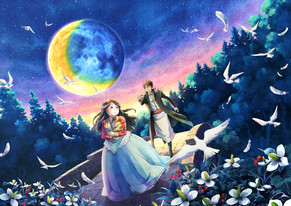Review
by Kalai Chik,| Synopsis: |  |
||
Based on Nao Iwamoto's Kin no Kuni Mizu no Kuni fantasy romance manga, the film follows two kingdoms that have come to a standstill after a millennium of strife. To cease the endless war, the Gold Kingdom (Alhamit) agreed to send their most beautiful girl to marry a man in the Water Kingdom (Balkari). The Water Kingdom would then send their cleverest man to marry a woman in the Gold Kingdom. However, once the time comes to make good on their agreement, both decide to send an animal in the place of a person. The King of Alhamit selects Sarah, a provincial princess, to marry the chosen Balkarian man, only to find out her groom is a puppy. Meanwhile, the Khan of Balkari nonchalantly elects the unemployed Naranbayar to be the lucky man to receive the Alhamit bride: a kitten. Both make the best out of their respective situations, and through a chance encounter, end up crossing paths on the Balkari side of the wall between their kingdoms. As they navigate through the schemes of their respective leaders, they develop a budding romance as they work together to avoid inciting another war. |
|||
| Review: | |||
Previously known for her work on the TV anime series Btooom!, Kotono Watanabe makes her directional film debut with Gold Kingdom and Water Kingdom. Her eye for storytelling is sincere, keeping to the source material while making subtle changes for a seamless flow from script to screen. But the nearly two-hour run time of this movie is almost a frame-by-frame animated retelling of the single-volume manga. The star-studded cast helps enhance Gold Kingdom and Water Kingdom, yet the movie wasn't confident enough to expand its world alongside its romance. This fairytale story's charm sits squarely with its main characters more so than its plot. It starts off with the two kingdoms' thousand-year-old backstory over a petty squabble, which leads to the events of the present day. There are a couple of overarching problems that seem logical in a manga format but feel tensionless in a film. Strangely, the issue with the longest lead time—the inevitable drought—is prioritized over the potential, immediate violence that will ensue if the main couple don't maintain their façade. Other than the potential return of war, the ticking resource scarcity bomb and the main couple's betrothal misunderstanding serve as concurrent, side problems, and it feels silly to worry about a plight that won't come to fruition for fifty years when either side is itching to find a reason to flex their military might. The three issues eventually coalesce in the climax, though the resolution comes so suddenly that it robs you of any time to unpack the implications. Admittedly, Watanabe's strength is in building the relatability of Gold Kingdom and the Water Kingdom's characters. The natural development between the two leads, and the maturation of their relationship, is refreshing. Sarah's kindhearted and thoughtful nature allows her to connect with Naranbayar off the bat, despite their different socioeconomic backgrounds. Because they're established as intellectual equals, the dialogue between the two likened to a happily married couple rather than two strangers getting to know each other. Their sincere, altruistic desire for each other's well-being is uplifting and hooks you investing into their romance. Unfortunately, there's a lack of subtlety with the rest of the cast. Juggling a crew of more than ten characters can be a struggle, and often they become one-dimensional. By the end, the antagonistic characters had their deeds explained away by their good intentions. There are no villains; only misled, lonely nobles. One of the film's highlights is the Ottoman and Mongolian-inspired architecture and clothing designs, especially in a sea of Western European-based fantasy anime series. The muted tone of the Balkari countryside starkly contrasts with the wealth of vibrant colors in the gold, desert land of Alhamit. Despite sharing the same language, even background characters mark the cultural differences between the two countries. Regarding the plot's pacing, it's clear the movie had difficulty filling up its runtime given how many flashbacks were used throughout the story. The audience hardly needs a reminder of a scene that happened less than ten minutes before. I wish more time was spent on worldbuilding in lieu of replaying old scenes. Instead, we're hurried through an explanation of the Alhamit king's hostility in the climax. Disappointingly, comedic moments were few and far between, and were often undercut by plot development needing to bring the story to a close. Gold Kingdom and Water Kingdom is a heartwarming movie that has just enough political intrigue to keep you engaged in its plot. There aren't many animated romance series targeted at women that don't involve villainesses or a European setting these days. It's a breath of fresh air when the leads also want what's best for each other without the drawn-out romcom squabbles. The movie likely won't break box office records, but it makes for an enjoyable date-night watch. |
| Grade: | |||
|
Overall : B
Story : B-
Animation : B
Art : B+
Music : B-
+ Great cast, relationship building between the leads feels genuine |
|||
| Production Info: | ||
|
Full encyclopedia details about |
||